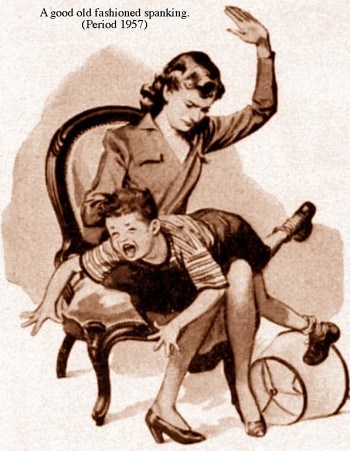Spankings: Pros and Cons
Drawing (Google Source): A few may recognize this temper tantrum. The young woman having the tantrum was likely caused by her son doing something she did not like. We assume it is her child and we have no idea why she is striking him? Perhaps her favourite lamp was tipped over after he was told to stop roughhousing. Hmm. That could have been me when I knocked over and broke Dad’s kerosene lantern at the fish camp.
In the footer is a schoolmaster with “attitude switch” speaking to a couple of boys. Back in the day, his actions were considered good classroom discipline. Also, in the last century, as late as the 1970s a man was also allowed to physically ‘discipline’ his wife, servants, and apprentices.
Many, but not all, of the mom’s and dads who administered spankings, were likely following in the footsteps of their parents or grandparents as far as the parenting choices they made. If the parents and grandparents did not spank their children, it is unlikely those children would grow up and spank their children.
The Good Old Days
With a potential change in Section 43 of the Criminal Code on the horizon, several comments and editorials are floating around about the merits of spanking children. As the old saying goes “spare the rod and spoil the child”. Various versions of the saying likely originated with Proverbs 13:24, but one needs to remember that various versions of the Bible were largely written over the past couple of millennia by men who lived in times when this was an acceptable form of punishment whether they believed in one of the bibles or not.
Some have carried the thought forward as being justified because it was considered “the word of God”, but most used it because it was an easy means for men to maintain control. Today, a good many people, including the majority of Christians, have given up the practice, yet skirt around the central issue of “when does spanking become a form of abuse?” The line is not at all clearly defined either in the Criminal Code or Case Law.
It is a given that many who spank their children are good people who love their children dearly and would never seriously hurt them in the process of carrying out some form of discipline, but there are those who abuse and that is a continuing problem that needs to be addressed. The challenge is how to divide the law between those who love and those who abuse. For those who love, spanking is not a real problem and it wouldn’t pose an undue hardship to find an alternative method (I). For those who cross the line into abuse, criminal sanctions are often necessary not only as a deterrent but also as a sanction that has some teeth.
If it was good enough for my parents…
Given effective parenting skills isn’t a required subject for new parents, many just adopt the style of parenting they experienced as a child. If that included spankings, they often carry on the tradition. For many, spankings are simply an easy way to express their exasperation or anger when a child misbehaves. Hitting is a natural response when anger replaces good sense.
 Personally, I don’t like spankings, never used them and neither did my parents who both found other ways to help me mend my ways when I did something that was either dangerous (The Fire Tower, moms quote by photo) or out of control (tantrum). Lord knows it was probably a pretty tempting solution on many occasions. Before you read further, take a moment to read Section 43 of the Criminal Code (I) and consider the latitude the section provides. There is little doubt the section prevented some charges from being laid in the most horrendous of situations including a litany of crimes committed in institutions.
Personally, I don’t like spankings, never used them and neither did my parents who both found other ways to help me mend my ways when I did something that was either dangerous (The Fire Tower, moms quote by photo) or out of control (tantrum). Lord knows it was probably a pretty tempting solution on many occasions. Before you read further, take a moment to read Section 43 of the Criminal Code (I) and consider the latitude the section provides. There is little doubt the section prevented some charges from being laid in the most horrendous of situations including a litany of crimes committed in institutions.
File Photo (2002) Many of you who knew our Mom will know she was strict in some ways, but a real softy in others. My grandmother, as far as I can recall, was very similar.
Many laws have changed because the world was changed and actions that were acceptable in the past – laws that mainly favoured a man’s view of the world – is no longer acceptable. Why? Today we know different and societies, those mainly controlled by men, will eventually become extinct. As a newly minted Prime Minister commented when asked why half his ministers were women, replied: “Because it’s 2015.”
Making a change to a Criminal Code section that has allowed a form of assault on children will not affect the majority of people, but it will send a clear message to those who step over the line into abuse. It’s a crime that crossed my path many times as a police officer and my sister, Dianne McNeill, who has spent a career in Social Services system and held oversight on such crimes, likely viewed it many more times than did I.
Of course, spankings are just part of the abuse of children as it can be either physical or mental and most would agree mental spankings can be far more abusive than physical ones. While both do harm to a greater or lesser extent, most parents know the limits and they are not being targeted by this proposed change of the law as they don’t step over the line to a degree that would invite an assault charge. It is those who do step over on a periodic or regular basis and who might see their actions as being allowed within the law, that is being targeted as they have no sense of proportion in these matters.
A Little History
Think back for a moment. Physical abuse in school (the strap and the switch) was not only allowed, but it was also encouraged as a primary means of bringing about ‘desired’ behaviour change. Within Canada, we are well aware of the most egregious use of physical and mental discipline within our history, which took place in residential schools. But, in the past, private and public schools likely carried out many forms of excessive abuse except they were more measured in their abuse as oversight of their activities was much stronger.
The majority of that discipline continued for decades because it was considered OK to do whatever was needed to change the behaviour or thinking of a child. That this abuse was was condoned and covered up by otherwise good Christian organizations, demonstrates just how deeply ingrained the practice had become ingrained in our society We now accept the catastrophic  toll inflicted upon Canada’s aboriginal children and no one should ever again support laws that allow the physical and mental abuse of children in schools and other institutions. However, the extension needs to extend to parents as, of course, this is 2015, not 1915 or times earlier.
toll inflicted upon Canada’s aboriginal children and no one should ever again support laws that allow the physical and mental abuse of children in schools and other institutions. However, the extension needs to extend to parents as, of course, this is 2015, not 1915 or times earlier.
Photo (click to open). Read the comments. While many would never attempt to physically discipline their wife, there was a sizeable portion of society who felt the action was a reasonable position to be protected in the family unit.
Forty-five years ago husbands (referred to as masters) could physically discipline their wives, domestic servants and apprentices. Many people (mostly men) were upset when these laws were changed. A hundred years ago woman and aboriginals could not vote. Again, many people were upset when the law was changed (again, mostly men). Fifty years ago a woman could not enter drinking establishments in some Provinces and in others were restricted to being accompanied by male escorts. I suppose one reason being is that women back in those days could not hold their liquor as well as men and someone needed to be home tending the children, doing the household chores and making dinner. People were upset when that changed, again, those upset were mostly.
Where are we headed?
When the ‘spanking’ law changes, which it will, individuals will adjust and those who take things to far may well land in court. For the most part, it is not much of an issue, as those who spank will simply adjust their parenting skills to methods more acceptable in 2015. As for schools, even though allowed under the Criminal Code, they have dropped the practice because the knowledge base about a more effective means of applying discipline is better understood.
Fifty years from now people will look back and wonder why on earth spankings were ever permitted under the law in the first place. We are fortunate in that our laws can be changed as the world changes. Some written laws are divine, therefore considered immutable. How well has that worked out?
Merry Christmas,
Harold
(1) One method is often referred to as positive discipline, which is included in many parenting programs. For several years I facilitated a program called Developing Capable People, and still have several text copies in my files. Send me a note (harold@mcneillifestories.com) or give me a call (250-889=1033) for details and a copy of the book.
(2) Section 43 of the Criminal Code
Section 43 of the Criminal Code(1) reads as follows:
Every schoolteacher, parent or person standing in the place of a parent is justified in using force by way of correction toward a pupil or child, as the case may be, who is under his care if the force does not exceed what is reasonable under the circumstances.
The defence of reasonable correction appeared in Canada’s first Criminal Code in 1892. The content has remained virtually unchanged since that time, with the exception of the removal of masters and apprentices from among the relationships covered by the defence.
The Criminal Code exemption that allows children to be physically punished remains insofar as parents and schools are concerned. I wonder if one of the Conservative backbenchers might wish to bring in a private members bill that would reinstate an exemption that would allow men to physically discipline their wives?
If you wish to see a demonstration of how much things have changed since the 1960s, just watch a few episodes of MAD MEN on Netflix. It’s a rather good historical account of a world in which men hold the reins of power.
Cheers,
Harold
(7401)
Trackback from your site.


